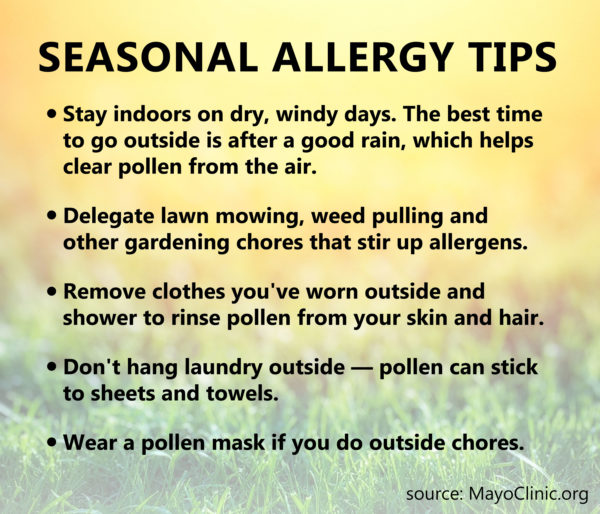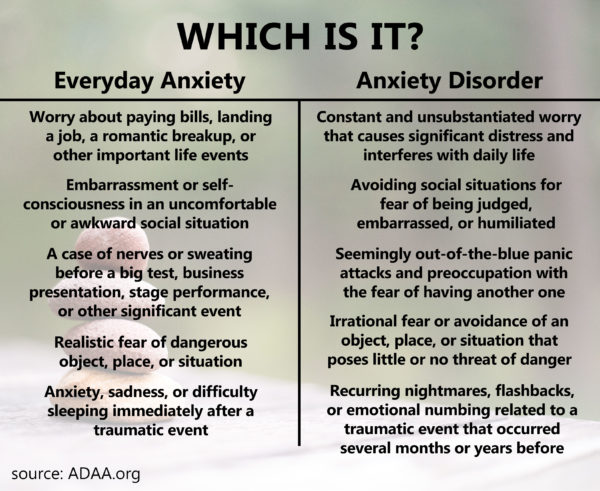Seasonal Wellness

We sat down with Dr. Maria De Leon to talk about Seasonal Wellness. We’ll be looking at some common healthcare concerns for patients during this time of year, including Seasonal Allergies, Stress and Anxiety and Depression. Continue reading to learn at-home and over-the-counter treatment options to help alleviate seasonal allergies and the signs, symptoms and treatment options for stress, anxiety and depression.
Seasonal Allergies
Allergies affect more than 50 million Americans and are the sixth leading cause of chronic illness in the United States. Allergies occur when your immune system reacts to an allergen – a foreign substance – and generally causes symptoms like coughing, sneezing, itchy eyes, runny nose, and scratchy throat. Allergic reactions can be caused by something you eat, inhale, or touch. Seasonal allergies, often called Hay Fever, are caused by airborne substances that vary during the year.
Spring allergies can begin as early as February and last through to summer. “Allergy issues generally occur when the weather changes,” Dr. De Leon explains. “Here in Florida, allergy season can be yearlong, depending on what you are allergic to.” Florida’s tropical-style climate with mild winters and rainy summer promotes a variety of year-round allergens.

“Pollens are the most common allergy triggers,” says Dr. De Leon. “Trees, grass, and mold can also produce symptoms like nasal congestion, sneezing, watery eyes, and itchy throat. More advanced allergic reactions can trigger an asthma attack, manifested by shortness of breath and wheezing.”
There are a variety of over-the-counter medications that can help when dealing with seasonal allergies, including Antihistamines (Claritin, Zyrtec, Allegra), Decongestants (Sudafed), Nasal Sprays (Flonase), and combined medications. You can talk with your doctor about your symptoms to find the best type of allergy medication to take.
“If allergy symptoms aren’t responding to over-the-counter medicine, prescription medications (like Singulair) are available and can help prevent acute flair ups of allergy issues,” says Dr. De Leon. Medication is not the only way to help when dealing with seasonal allergies. It’s important to know and avoid your triggers whenever possible. Southwest Orlando Family Medicine offers in-house allergy screenings to identify specific allergy triggers that may occur seasonally or year-round, and help you to avoid the ones that cause reactions.
Monitoring pollen and mold counts during allergy season can give you fair warning to take your medications before you start experiencing symptoms on days with high counts. Avoiding outdoor areas where you’re most susceptible is also a key factor in reducing reactions. Tree and grass pollen counts (spring/summer) are highest in the evenings, while ragweed pollen count (summer/fall) are highest in the mornings.
Stress and Anxiety
 The holiday and post-holiday season are often celebrated with friends and family, travel, and new resolutions, but they can also lead to increased stress, financial concerns, and changes in weather and sunlight that can negatively impact our mood and mental well-being. Stress, anxiety, and depression can feel more pronounced during the holidays for many reasons, including the cost and energy required for extensive travelling for special occasions, the added expense and pressure of gift giving, and the poignance of missing loves ones.
The holiday and post-holiday season are often celebrated with friends and family, travel, and new resolutions, but they can also lead to increased stress, financial concerns, and changes in weather and sunlight that can negatively impact our mood and mental well-being. Stress, anxiety, and depression can feel more pronounced during the holidays for many reasons, including the cost and energy required for extensive travelling for special occasions, the added expense and pressure of gift giving, and the poignance of missing loves ones.
Occasional anxiety is a normal and expected part of life. However, strong feelings of anxiety that are persistent and impact daily activity may be part of an anxiety disorder. Generalized Anxiety Disorder is classified by excessive anxiety or worry for periods lasting more than six months and can be attributed to a number of causes as well as a variety of symptoms.
“Relationships, finances, and work-related stress can exacerbate feelings of anxiety and trigger physical symptoms,” advises Dr. De Leon. “It can cause a multitude of symptoms, such as palpations, fear of going out, nausea, panic attacks, and emotional and physical distress.” There are several disorders that anxiety can be attributed to, including social anxiety disorder, obsessive-compulsive disorder, PTSD, and more.

It’s not just adults who deal with symptoms of stress and anxiety. “Stress and anxiety can affect any age group,” Dr. De Leon warns, “from children to adults to seniors.” Anxiety disorders affect 1 in 8 children and nearly 40 million people in the United States alone experience an anxiety disorder each year.
“Counseling can be very important to help assuage anxiety issues,” suggests Dr. De Leon. “Identifying potential triggers and working on ways to avoid them or developing coping mechanisms can help to reduce overall stress and symptoms.”
Treatment options for anxiety can include Cognitive Behavioral Therapy, medication, support groups, and stress management techniques. Non-prescription medical approaches like yoga and meditation can also help. “Participating twice a week with community yoga and daily meditation can help to reduce stress, anxiety, and physical issues,” advises Dr. De Leon. Studies have shown that yoga can help reduce the impact of the stress response and aid in those suffering from anxiety and depression, according to Harvard Medical School.
Depression
“For those who have lost loved ones, the holidays, post-holidays, and winter season can trigger seasonal depression symptoms,” Dr. De Leon explains. “It always helps to talk to your clinical team about your feelings and concerns.”

“People don’t like to talk about depression,” Dr. De Leon admits, “but they should be aware that we are always here to help.” Early detection of depression can help prevent the consequences of heavy depression, including chest pain, weight changes, physical complications, mental concerns, and more. Therapy, medication, and lifestyle changes with the aid of a professional can help people suffering with depression to manage their symptoms and prevent more dire circumstances. “Untreated depression can lead to chronic medical conditions for those who cope with stress eating, under eating, lack of physical activity, and overall disinterest in taking care of themselves” warns Dr. De Leon.
Seasonal Affective Disorder (SAD) is common during this time of year. SAD is a type of depression that recurs seasonally, typically during the fall and winter. Symptoms of SAD include low energy, hypersomnia (excessive sleepiness), weight gain, and social withdrawal. Treatment options for SAD include light therapy, psychotherapy, medication, and more. Some treatment plans may also include things like regular exercise, outdoor activities and coping management.
If you are struggling with depression and need immediate help, you can reach the National Suicide Prevention Lifeline 24/7, which provides free and confidential support for people in distress. You can also schedule an appointment to see your clinician. You are not alone when it comes to feelings of stress, anxiety and depression. Talking with your healthcare provider is a good first step. “We can help guide you and provide treatment and therapy options,” Dr. De Leon explains.
Conclusion
Changes in season and weather can bring about a variety of healthcare concerns. Managing your seasonal allergies can help reduce and prevent reactions that can occur at this time of year and beyond. Learn what you’re allergic to, avoid the triggers, and talk to your doctor about over-the-counter or prescription options that will keep you happy and healthy. When it comes to mental health, it’s important to stay open and honest with your clinical team. Stress and anxiety that negatively impacts your life can be managed, and there are many treatment options that may not require medication. Remember that the seasons can exacerbate anxiety and depression symptoms, and that it’s okay to ask for help.
Every month, we sit down with a member of Southwest Orlando Family Medicine’s Clinical Team to talk about all aspects of patient healthcare as part of our Health & Wellness series. You can read more on the topics we’ve covered, including Heart Health, Women’s Health, Men’s Health, Children’s Health, Healthy Aging, and Preventive Medicine.
We’ve spent the last 30 years serving the Central Florida community and are committed to Helping Patients Live Healthier Lives. Ready to talk with your clinician? Book an appointment with us today.
Clinician Contributor:

Disclaimer: All information presented on this website is intended for educational purposes only and not intended to replace your individual medical advice. Please review this information with your clinical team to ensure it is appropriate for your individual medical needs. The information contained is not intended to diagnose, treat, cure or prevent any disease.
